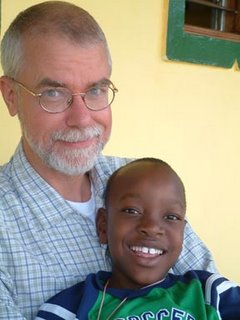An Enterprising Mango Tree.

Mango Tree is a social enterprise which creates innovative tools for educators, to improve learning and retention within the classroom. It makes board games, learning charts, and other educational tools- all designed using local materials; from bottle tops to flip-flops. The use of such materials means that the tools are seen as ‘renewable’ and ‘familiar’, and are therefore used.
The idea emerged after Craig Esbeck spent just over two years working as a Peace Corps volunteer in Eastern Uganda. Far too often Craig would notice that books and resources would be donated from overseas agency- only to end up locked inside a cupboard, ‘to keep them nice’.
In addition, the National Curriculum authorities had grand designs for schools, stating that each should be equipped with resources, or ‘minimum standards’, and provided a funding line for supplies. All very well, however, looking around Craig saw that there were limited local suppliers or resources available- just chalk and a few basis reading text books. So he set about rectifying the situation.
‘I wanted to do something which would encourage teachers to try some other ways of teaching’, he explained, ‘to start to shake up the paradigm of what learning and education is’.
He started the business with three board games; Snakes and Ladders, Ludo and Draughts, all part of the ‘minimum standard’ requirements. He started to make them on big grain sacks, and then began to train the teachers in how to use the games. It was through those training workshops that Craig learned that the teachers also wanted some guidance on how to teach reading; and supplies to back them up.
So Craig started buying old flip-flops and cutting out the alphabet. He went to the schools and told the children that he would buy flip-flops ‘for a penny a piece’. Soon bags and bags of old flip-flops started arriving, and from that he had the basic resources to make alphabet charts. The business model has changed now, but it was from such simple beginnings that it developed. Now Mango Tree resources are in about 25% of the schools in Uganda- and they are looking to expand.
When I arrived to meet Craig, I was greeted by himself, and a beautiful, gleeful child called Derek. I was later to find out that Craig is Derek’s legal guardian, and is in the process of adopting him, along with another child, Will.
The story of how Craig and Derek came to be together is rich in the ‘pull at the heartstrings effect’, and shocking- but one which I also find remarkable.
Craig was living in Eastern Uganda at the time. A knock on the door one day introduced him to a young woman from the area, who said that she needed his help. Craig went along to her home, only to find Derek lying, covered in faeces and open wounds, literally under a bush. Derek suffers from Cerebral Palsy, a condition which is little understood in the villages, and was treated as an outcast.
Meeting Derek, Craig said something ‘clicked’, and he knew he had to help. At the time he thought that would involve bringing Derek to a children’s home in Kampala, but once he started to care for him, he realised that he wanted to continue to do so.
Three years later, Derek is now in a local school in Kampala, mainstreamed with the other children. His face, smile, charm and energy was palpable. There is something remarkable about this child, and it has left me wondering how many more inhabited bushes are out there, and how many more Dereks.


1 Comments:
Dear Clare,
I really liked this piece. Craig Esbeck's work strikes me almost as a socioculturally-grounded version of found art objects. Objects that are not only are put to good use, but that also deliver in a wonderfully practical way a simple message about renewability and about the preciousness of the items we discard daily.
5:12 am
Post a Comment
<< Home